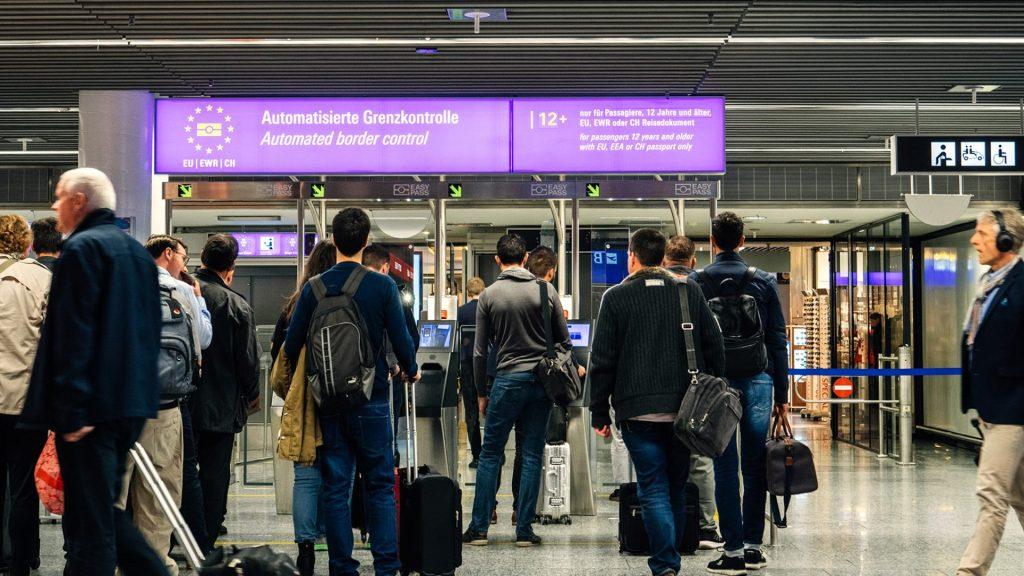Message has been successfully sent!
IT relocation to Germany as a high skilled immigrant in 2020
- 26.08.2020
- 1192

Quarantine is a challenging time for many businesses, including recruiting. According to the internal statistics of our IT relocation agency, the number of local vacancies in work in April 2020 (compared to April 2019) decreased by 36%. At the same time, nothing has changed in projects with our Germany partners, except for the fact that the relocation itself was postponed until the borders will be open. Therefore, we asked ourselves: does it seem to us or the consequences of COVID-19 for IT business in Germany are less tangible than in Ukraine?
We’ve decided to check it quickly by talking with our partners and people from the IT network in Germany, asking about the impact of the pandemic on their work in particular, also about any changes in their business strategies, hiring high skilled immigrants, and professional activities of the company.
IT job market in Germany during the quarantine
Among the respondents: Chantelle Kandan (Human Resources Specialist, Cinemo, Karlsruhe), Volodymyr Pavlyshyn (programmer, YouTube channel author about relocation and life in Germany, Berlin), Elena Frolova (business analyst of IT projects, Munich), Pavel Grafov (Software Developer, Delivery Hero Austria, Berlin).
Chantelle Kandan
Despite COVID-19, Cinemo is fortunate enough to maintain its leading position in the automotive entertainment and information industry. The pandemic has not affected the level of services provided by the company and its hiring processes. But in these new conditions, all this is supervised online, plus the necessary equipment and materials delivered to employees not only in Germany but also abroad. There is an alternative to developers’ relocation to Germany.
In case of unforeseen circumstances, the company developed a plan according to which all employees guaranteed to receive everything they need to work remotely during a pandemic. We believe it is rational to maintain flexibility in the matter of working from home in the future, and we will not force employees to go back to the office until they are ready for it. We are proud of the employees at Cinemo and how we united as an organization to deliver excellence despite the circumstances. Likewise, we are mindful of parents that have adjusted to working from home and caretaking their children. It could have been a challenge for many.
Everyone is waiting for the situation to stabilize and rely on the strategy of the German government for reconstruction. It unites everyone because COVID-19 slowed down the development of the market, affecting all industries without exception.
Volodymyr Pavlyshyn
Before quarantine and partly during that time, I worked in the IT business for the real estate market and investors. For most of the quarantine period, our company has had even more work than before, but then an unexpected layoff of staff followed. Fortunately, thanks to the internal network and the hot market, I’ve got a new contract in less than a week.
Elena Frolova
Our company provides IT services to a wide variety of companies, so I can say that due to the pandemic, the downfall is noticeable in many areas. For example, our main client was an automotive company, which stopped manufacturing with the onset of quarantine, and employees just lost their projects.
As for layoffs, the reorganization, which began in January, helped us to avoid this. We were bought by a large company and became part of a holding company that gave us support and resources that significantly exceeded the original ones. About fifty people sent to the Kurzarbeit, but in general, there weren't job cuts.
Presently our employees work remotely. Up to now, no one is talking about a full-fledged exit. The company has created a rule that only 20% of employees can attend the office, but for this, you need to get permission from the management, which is quite hard. At the same time, access to the office of employees who are outsourced by the company is impossible at all. I guess the developer relocation paused too. As for me, I like remote work, and I can say that it did not affect work processes in any way. I don't spend 2 hours a day to get to the office and can better plan my time when I am not fully loaded. We have already discussed the possibility of using multiple remote days per week in the future.
The state is gradually easing quarantines, but many restrictions still apply. As far as I know, the government has promised to help small businesses, but it's not that simple. Also, the format of assistance from the state is a loan. Many people don't like this either, so most businesses refuse to do it.
Pavel Grafov
I work for Delivery Hero Austria. Our company engaged in the delivery of food from restaurants, and we are part of the international holding Delivery Hero. We operate in the Austrian market, although our office is located in Berlin. There are a little less than 200 people in our company. We can say that we had a short-term decline in the number of orders, but now we have returned to pre-crisis indicators. There were no changes made to the strategy of work and further hiring of employees (at least, I don't know anything about this, and we have a very open company, and all-important changes are always announced). Employees have started working from home, and even though it is already possible to return to the office, most still choose to work remotely. It is highly likely that, at least until the end of the year, the restrictions on the number of people who can be in the office at the same time will remain. As for me, I don't really like this type of work, but I think many can benefit from it.
COVID-19 has negatively impacted almost all industries and the entire German economy. The biggest downfall was detected among companies that deal with travel and micromobility. I am confident that the Germans will be able to restore the pre-crisis level quickly and efficiently.
IT job market statistics: what German companies hire software developers during quarantine?

According to the study made by the federal labor agency, the number of unemployed people in April 2020 was equal to 1.89 million. There are 220,000 people or about 13.2% rise compared to March 2020 and about 38.0% rise compared to April 2019.
As for the IT industry, in April 2020, according to various sources, there were from 17000 to 39700 IT jobs in Germany, and Heise online estimates the volume at 51,000 (since, according to an unspoken rule, companies report to the federal labor agency only about one of three vacancies). In comparison, at the beginning of 2020, there were 124,000 open positions for IT specialists through Germany.
At the same time, the number of IT job openings in job search sites in March and April 2020 dropped by only 6%, taking a majority part of all vacancies at all.
One of the reasons for this demand is that many companies are looking for digital solutions and are actively moving towards digitalization. The following industries, despite the downturn, continue to hire foreign engineers in Germany: IT&T, healthcare, logistics (SAP / SCM), and technology startups with innovative ideas for crisis solutions.
An interesting fact: to support distance learning in more than 40,000 schools in Germany, 20,000 additional IT experts, specialists, and computer science teachers, are needed. An interesting fact: 20,000 additional IT experts, specialists, and computer science teachers, are needed to support distance learning in more than 40,000 schools in Germany.
Summing up, despite the visible recession and contractions are tangible, including in IT, the market is gradually adapting. According to our internal statistics, requests from German companies for remote employees have significantly increased, and specialists can get IT works in Germany. But most companies don’t deny using this information for studying the market, but actual decisions will be made later.
Relocation of IT specialists to Germany during quarantine: our experience
We can say that high skilled immigration in Germany is still needed. During the first months of the quarantine, nine candidates have received offers (five people from Ukraine and four from Russia), and the companies were ready to take them asap. The guys could not fly away for interviews or start work on the planned date, since the embassies did not work.
In Russia, it was generally impossible to apply for a national visa using the Blue Card before 01.07. Apparently, many were waiting for this particular date, since our developer was able to get a reservation date on the day of the start of submission of documents only for August 3, 2020, having spent a whole day monitoring the situation. А visa for a highly-skilled immigrant received within ten days, the flight to Frankfurt is planning on 08.20, and the exit to work is on 21.08.
In Ukraine, the German Embassy in Kyiv worked "individually" through a preliminary letter describing the situation by email. A full-fledged reception and consideration of documents for obtaining national visas under the Blue Card resumed in the usual schedule only from June 15th.
At the same time, finding out the date and time of submission of documents for the near future was quite problematic, so one of our applicants was able to apply only on 15.07. The embassy staff informed him that the application would be considered 12-15 weeks. Luckily, all applicants for the Blue Card go for approval first, that is why one can expect to receive a visa in 6 weeks (which was clarified by the embassy staff the next day). In fact, the visa was ready on August 21, and in time it took only 5 weeks.
Another candidate with Ukrainian and Bulgarian citizenship also completed all the bureaucratic procedures for moving in August and starting work in the office from 22.08.
Due to the heavy workload of the German Embassy in Ukraine, the candidate who received the offer in July was able to register for submission of documents only for the first week of October.

All our candidates are at different stages of paperwork, and this takes a mega resource for both sides. The usual and well-established relocation scheme does not work in these realities, and all participants in the process, including embassies, relocation agencies, employers, are forced to act ad-hoc, often receiving new input.
The bottom line is the following: having received offers in April-May (4 candidates) and July (5 candidates) for today, we still do not have exact dates of candidates' relocation and needed documents. Our real experience: August - a trial day for one specialist, submission of documents, visa, employment of the second and third specialists; September - full relocation of the fourth, departure is scheduled for the first day of the month. At the moment, the expected offer - start date will be at least three months (before quarantine, this figure for Skillers averaged two months).
Sharing the details of each case in this article is problematic because each of the guys has their nuances (registration, marital status, secondary education, salary offered, etc.). Unwittingly, our BDM Viktoriya Bilytska, took on the role of a relocation agent, studying all the features and advising relocation agencies and employers in Germany and, above all, supporting candidates.
So far, all parties (employers, candidates, and we :) are optimistic and move on. We will gladly share the course of events and the triggered algorithm of actions.
By now, there are regular flights to Germany from Ukraine. As well you can go to Germany from Russia: Aeroflot renews its flights to Frankfurt on August 20.

How to Hire Experienced Software Developers in Europe
Internal Secrets of a Recruiting Agency
- Most Effective Sourcing Methods
- 6 Steps to Reduce Time-to-Hire
- European Tech Talent Market Review
- Salary Data for Each Technology and Country
- Access to our Private Mailing List
